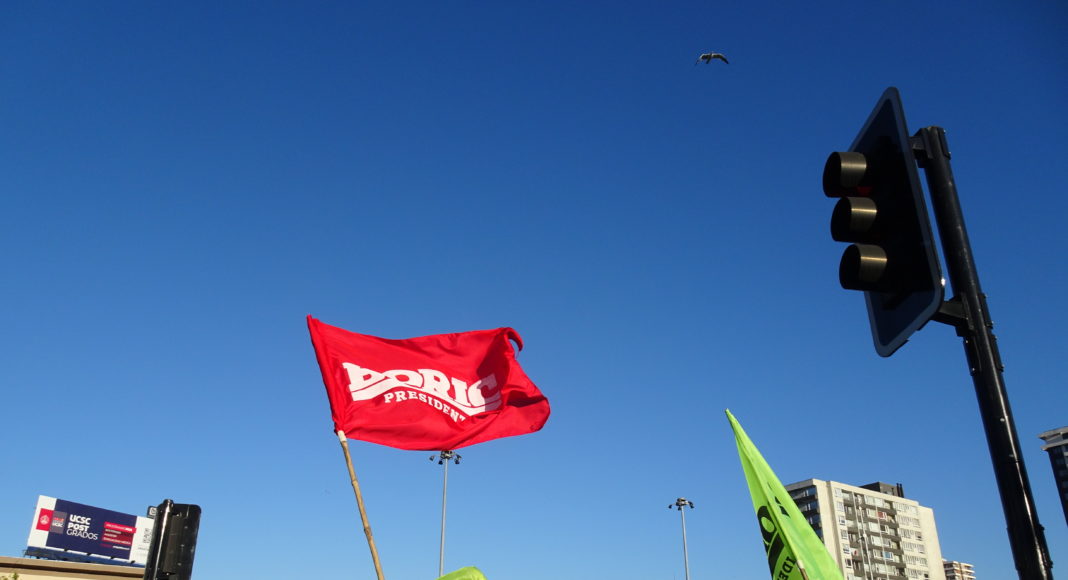LAB editor Emily Gregg was in Concepción, Chile, for the momentous voting and result in the second-round of the country’s presidential election. Here is her first-hand account.
Last night, Sunday 19 December, new left leader Gabriel Boric Font won a historic election in Chile. At 36, he will not only be Chile’s youngest ever president, but he was also the candidate to have received the most votes in Chile’s democratic history. Boric secured almost 56 per cent of the vote compared to his far-right rival, Jose Antonio Kast’s 44 per cent, and successfully won over regions that favoured Kast in the first round.
A strong last-minute performance in the final debate last Monday between the two presidential candidates may have stolen the victory for Boric, but his electoral promises, youth and student-leader background suggest that he will bring the changes Chilean people have long searched for.
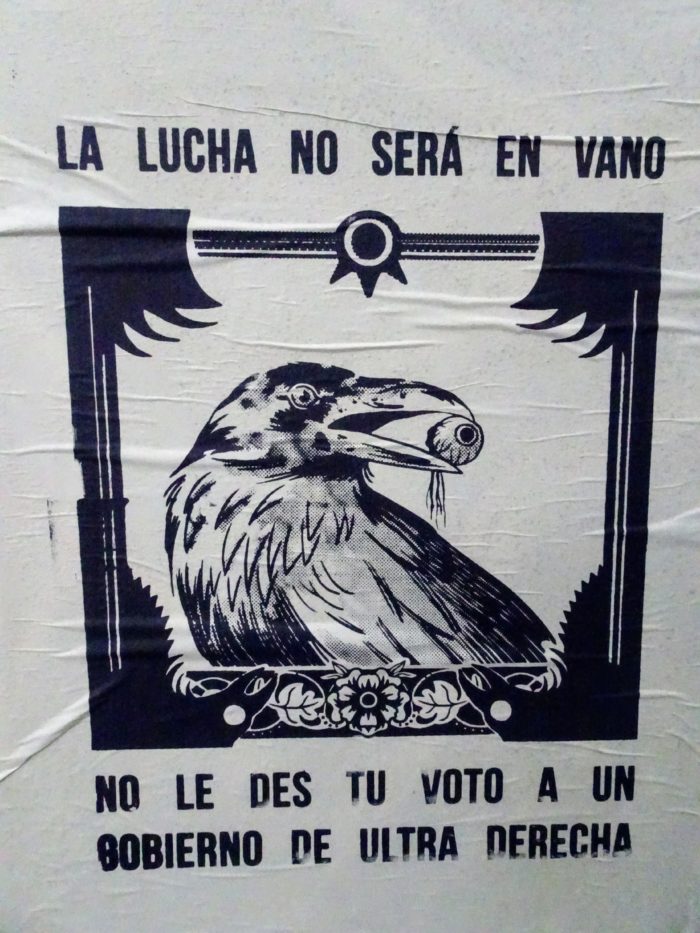
In televised debates as in campaigns, the social outburst of 2019 was top of the agenda. ‘Peace’, ‘security’ and ‘justice’ were bounced around at every opportunity from all candidates since the early days of the campaigns. Yet in the presidential run-off, Boric’s promises to change the harsh neo-liberal system that drove the protest won him favour over Kast’s promises to toughen and expand it.
In Concepción, Chile’s second city some 500km south of Santiago, voters celebrated his victory as the arrival of long-needed change. The small crowd gathering at the main roundabout as the victory was announced soon overflowed into the nearby streets.
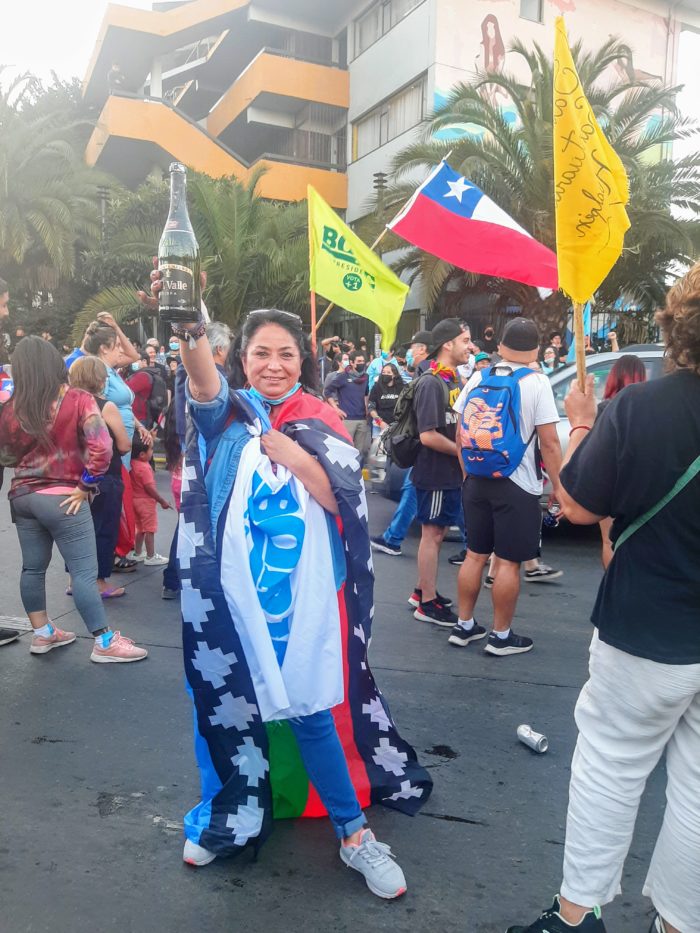
The crowd chanted ‘We’ve defeated fascism!’ and ‘The people united will never be defeated!’. Above flew a sea of flags for Chile, Boric, trans and gay pride, and Mapuche and indigenous communities. People popped bottles of prosecco, sang and danced in the street with their friends, families, children and dogs as cars crawled through the crowds, tooting their horns in solidarity, passengers hanging their own banners out of the windows.
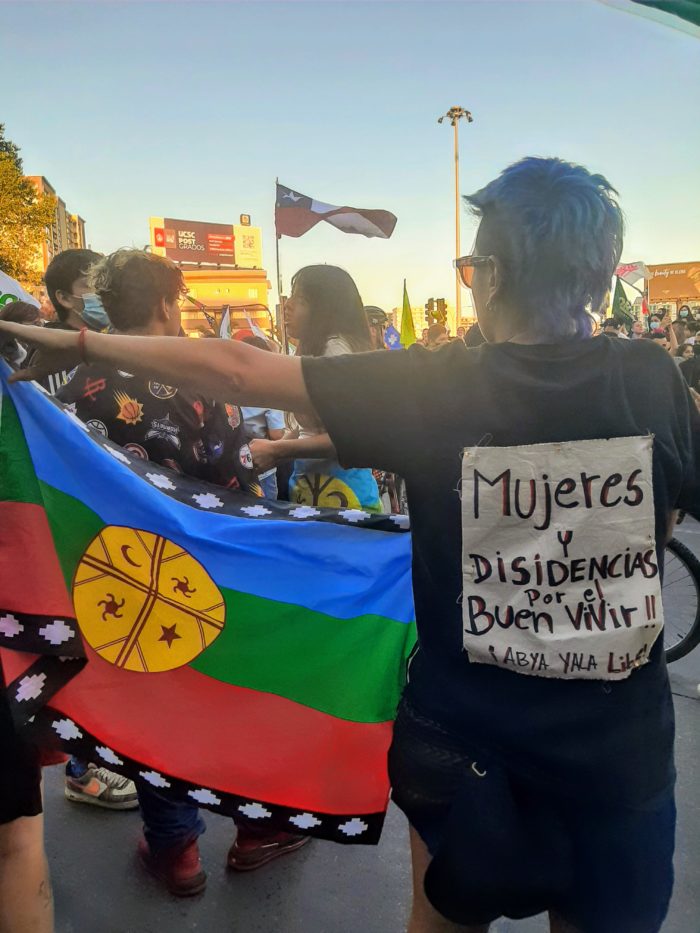
There was no sign of Carabiñeros, Chile’s police, infamous for their excessive and disproportionate attacks on crowds and political gatherings, especially during the estallido social of 2019-20.
Las anchas alamedas
Rony, a fourth-year law student at the University of Concepción waved the gay banner at the rotunda where celebrations were taking place. He said that, for him, the victory was ‘the first step towards achieving dignity for the peoples of Chile whose demands have historically been excluded… my own personally, as a sexual dissident, but also those of the Mapuche and their lands and all the demands that have accumulated since the dictatorship, through the legacy of the regime of Augusto Pinochet.’
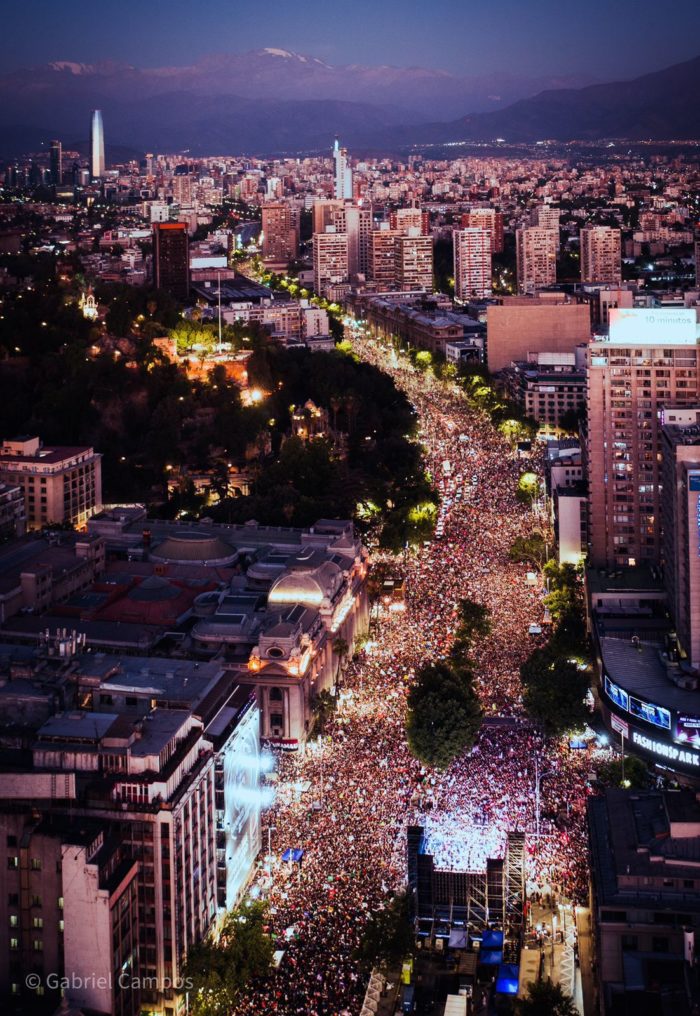
For Rony, the most important change will be the enactment of the new constitution which will end the legacy of the dictatorship. He said, ‘I hope that this government and post-dictatorship era will mean an opening of the great avenues that Salvador Allende once spoke of, down which we would walk and cross together, happy as we are in this moment, celebrating in this square.’
Despite the voting figures, Boric’s win did not come easily. A prominent right-wing activist and leader of the Rechazo movement published a video on social media encouraging Kast’s supporters to obstruct the vote count on the election day.

There were also reports of a significant lack of transport especially noticeable in the poorer areas of Santiago, where voters were more likely to vote for Boric. Suspicions of foul play were widespread and theories included: retaliation for the damage done to public transport during the 2019 uprising; an attempt bof the owners of the bus companies to thwart Boric, who wants to increase fuel prices; or simply an attempt to boycott Boric’s strongholds. Government spokesperson Jaime Bellolio denied that there was any reduction in public transport and Minister for Transport Gloria Hutt apologised.
A victory for the people
Transport difficulties did not stop people from exercising their right to vote. Neighbours and strangers offered lifts to those waiting up to an hour for a bus, sometimes making several trips to help as many as they could. Rony believes this reflects the nature of the incoming government. ‘This will be a popular government, reflecting its origins. The current government didn’t even give us a means to get to the polling stations. It was the people who helped one another to get there. This victory is for the people!’
Valentina, aged 28, described herself as ‘a grandchild of the dictatorship.’ She wore a t-shirt with the slogan ‘Women and dissidents for the good life! Free Abya Yala [Continent of Life]!’ For her, ‘The estallido social (social outburst) started to change everything… Now for the first time we have a government that represents us, that is close to us.’
Valentina noted that she still has her doubts, and as a lesbian woman, questions power. Nonetheless, she has hope and sees this moment as a fight for future generations. ‘We want to see really simple changes like free healthcare, free education, the end of the AFPs (privatised pensions funds), and the end of for-profit.’
Two older men shared Valentina’s hopes for Boric’s government. They stood on a corner a few blocks from the rotunda. Tomás, wearing a purple Boric hat that matched his glasses and enthusiastically waving a Boric flag at the cars passing by, who beeped and cheered in support, said that Boric’s victory represented progress for democracy, for human rights, and for women. Boric’s youth and even tattoo, Tomás remarked, was to be celebrated for its break from the traditional political elite.
His friend David believes in the changes Boric will bring and hopes for a fairer future for young people with free healthcare and free education.
The winner’s victory speech surely reinforced Chileans’ hopes. Boric emphasised his plans and determination for change, but he also expressed that they will not be easy to accomplish. Strong traditional links between economic and political power, a minority government (the Apruebo Dignidad coalition gained only 20 per cent of Senate seats and 21 per cent of seats in the Chamber of Deputies), and recovery from the pandemic stand in the way of any easy presidency.
Nonetheless, in a bold dig against his predecessor, he has promised that respect for human rights in all its forms and in all places will be his government’s priority. He pledged to ‘never declare war against our own people’ – a statement that no democratically elected leader should ever need to utter.
Last night was not a quiet Sunday evening in Chile. But it was peaceful, joyous, and hopefully represented what the next four years will look like.

